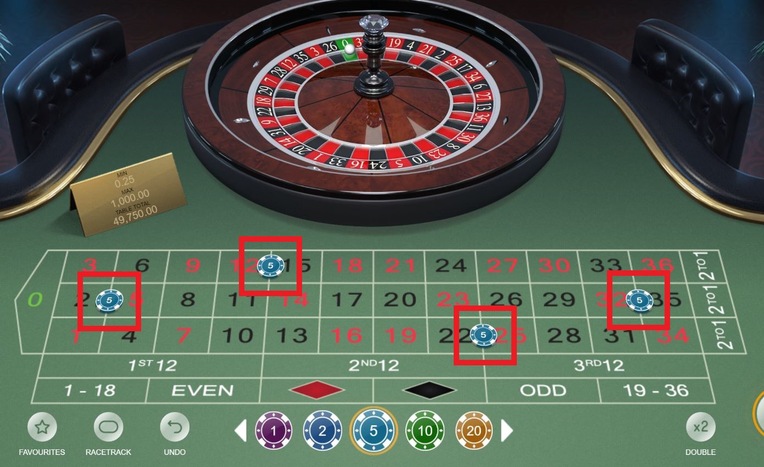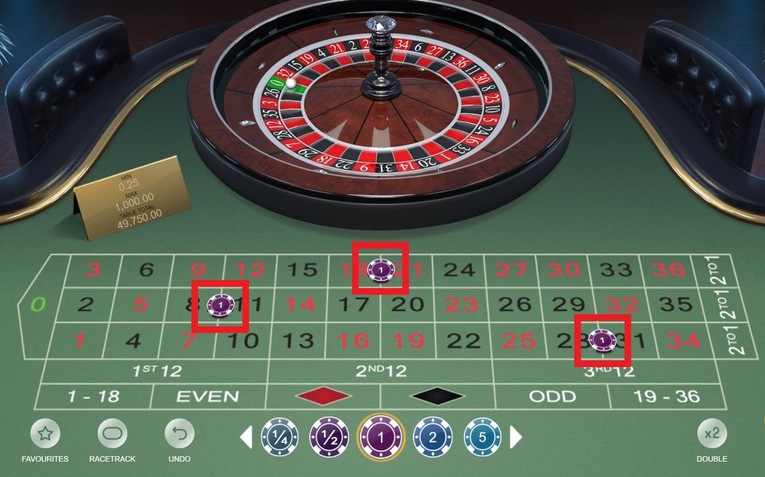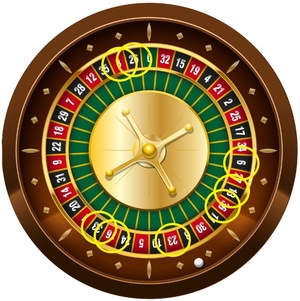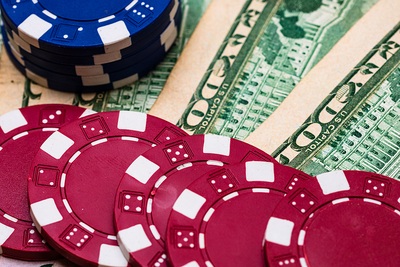The final cheval bet can be seen as a simpler version of the finale cheval plein bet, and it isn’t a hugely expensive bet to make either.
It involved placing a series of splits across numbers ending in the same two single digits.
How Does the Final Cheval Bet Work?

The final cheval bet is made by grouping together a number of split bets, based on two specifically chosen single digit numbers.
Once those two single digit numbers are chosen, the player places their chips on the line between any two adjacent numbers on the roulette board that end in those single digit numbers.
So as an example, if the numbers 2 and 5 were chosen, then split bets would be placed to cover 2 and 5, 12 and 15, 22 and 25, and 32 and 35.
That would be four bets in total covering 8 numbers, so just over a fifth of the board.
The layout of the board means that only certain numbers can be paired to place the finale cheval bet, and these are as follows:
| Numbers Chosen | Numbers Covered |
|---|---|
| 0 and 3 | 0/3 – 10/13 – 20/23 – 30/33 |
| 1 and 4 | 1/4 – 11/14 – 21/24 – 31/34 |
| 2 and 5 | 2/5 – 12/15 – 22/25 – 32/35 |
| 3 and 6 | 3/6 – 13/16 – 23/26 – 33/36 |
| 4 and 7 | 4/7 – 14/17 – 24/27 |
| 5 and 8 | 5/8 – 15/18 – 25/28 |
| 6 and 9 | 6/9 – 16/19 – 26/29 |
| 7 and 10 | 7/10 – 17/20 – 27/30 |
| 8 and 11 | 8/11 – 18/21 – 28/31 |
| 9 and 12 | 9/12 – 19/22 – 29/32 |
As you can see, the exact numbers you choose will also impact the number of bets you need to make, since the board only goes up to number 36.
So the bet could cost you 3 betting units or 4 betting units.
Here is an example of a board with fewer bets using higher single digit numbers.

You are free to choose any two numbers from the table above that you like, but some people like to use this bet using the last number from the previous two spins.
So if the previous two spins were 12 and 35, you would use 2 and 5 as your finale cheval bet.
It won’t always be possible to make a finale cheval bet from the previous two spins – numbers 33 and 25 for example would give us 3 and 5, and they aren’t next to each other on the board – so players who do this are effectively letting the game tell them when to bet and on what, leaving their decision to random chance.
Why Do People Use the Final Cheval Bet?
 The final cheval bet is a popular one with people who are experimenting with roulette and have advanced from ‘beginner’ status. It’s a natural next step once someone has mastered the basics of the game.
The final cheval bet is a popular one with people who are experimenting with roulette and have advanced from ‘beginner’ status. It’s a natural next step once someone has mastered the basics of the game.
It’s also useful for people who want more exposure than they would get with a finale plein bet while keeping costs down, but who don’t mind smaller rewards when their numbers hit.
Lucky numbers might also come into the decision for some players, while others might prefer to let fate decide as described above, with the game telling them when they should and should not place a finale cheval bet.
The bet will also create a few satisfying pairings on the wheel itself, which in effect creates a double slot for the ball to land in if it is headed in that direction, so provided the ball is heading towards one of those pairings, there is more chance of a win at that stage.
However, it doesn’t alter your chances of winning overall; the ball could just as easily go towards an area you don’t have covered at all.
What Are the Odds of Winning a Final Cheval Bet?
 The odds of winning a final cheval bet depend on how many numbers you have covered, and that will depend on the single digit numbers you chose in the first place.
The odds of winning a final cheval bet depend on how many numbers you have covered, and that will depend on the single digit numbers you chose in the first place.
Choosing single digits that result in 4 bets being placed will give you an 8 in 37 chance of landing a win, while digits that result in 3 bets being placed will give you a 6 in 37 chance of landing a win.
This translates to either a 16.21% chance or a 21.62% chance of the ball landing on a number you have covered with one of your splits.
The split bet itself is worth 17:1, so assuming you have made a £5 bet any win will return £85.
We do need to subtract our losses from the other bets though to get a true return, and again, this will depend on how many bets you made.
- 3 x £5 = £15
- 4 x £5 = £20
So you will end up ahead by either £70 or £65 after a win once losses have been accounted for.
